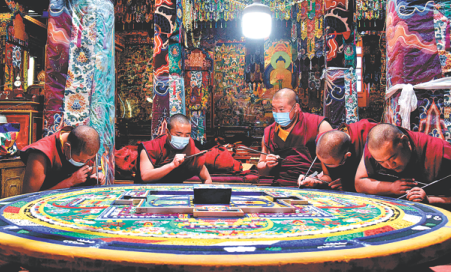Panchen urges faithful to better serve nation
Updated: 2022-03-14 (China Daily)  Print
Print 



Monks from Gundelin Monastery in Lhasa, Tibet autonomous region, create a Mandala sand painting, an exquisite religious artwork of Tibetan Buddhism. [LI LIN/CHINA NEWS SERVICE]
Tibetan Buddhism should better serve national development, social progress and people's happiness through reforms and progress, said the 11th Panchen Lama, Bainqen Erdini Qoigyijabu.
The founding of New China and the democratic reform in Tibet helped Tibetan Buddhism adapt to a socialist society, but the religion still needs to conduct more exploration and improvement in terms of doctrines and regulations, rituals and customs as well as ways of belief, the Panchen Lama told China News Service on the sidelines of the annual session of the National Committee of the Chinese People's Political Consultative Conference, which ended on Thursday.
He said it is necessary to analyze, organize and interpret the contents of doctrines that are healthy, civilized and conducive to social harmony and social progress and guide monks, nuns and other believers to transform their religious faith into the driving force to build their hometowns and serve society. He added more work should be done to eliminate superstition and utilitarianism and prevent commercialization, so that "Buddhism can better enrich people's spiritual realm".
Last year marked the 70th anniversary of Tibet's peaceful liberation. Since 1951, the region has undergone drastic changes, enjoying unprecedented population growth, work and life, democratic reform, improved infrastructure and more employment and business opportunities.
Over the past six months, the Panchen Lama, one of the most important figures in Tibetan Buddhism, has conducted field research across the Tibet autonomous region, as well as other areas inhabited by members of the Tibetan ethnic group in Sichuan and Gansu provinces, and he said the changes in the farmers and herdsmen he saw were beyond his imagination.
Several counties, including Amdo and Shanza counties in Nagchu, which are more than 4,500 meters above sea level, have been connected to roads, as well as electricity, water, internet and heating systems.
"I had thought these places to be very poor and backward," said the Panchen Lama, who has been a member of CPPCC National Committee since 2010.
He added he was very moved to see these drastic changes. Under the leadership of the Communist Party of China, Tibet has enjoyed the fruits of reform and opening-up, and the Tibetan people have joined the people of all ethnic groups in the country to achieve a moderately prosperous society.
Tibetan Buddhism has also undergone positive changes along with the social and economic progress in Tibet.
Also vice-president of the Buddhist Association of China, the Panchen Lama said Tibetan Buddhism was once eroded by feudal serfdom in old Tibet and operated contrary to the original wishes of the Buddha, thus becoming a tool for serf owners to rule.
He said it was after the founding of New China and democratic reform that Tibetan Buddhism was put right and purified.
In the past, Tibet was ruled by feudal serfdom under theocracy for centuries which was also the root cause of the region's poverty.
Millions of serfs were subjected to cruel exploitation and oppression. In 1959, the central government carried out democratic reform in the region which completely abolished serfdom and freed serfs to own their own land and livestock, marking a new beginning for the region to develop.
Since then, people in Tibet have participated in the running of the nation and the nation has promulgated a series of laws to protect their freedom of religious belief and activities.
Also serving as a member of the Standing Committee of the CPPCC National Committee, the Panchen Lama has put forward proposals on the development of Tibetan Buddhism and of animal husbandry on the Qinghai-Tibet Plateau.
He said his proposals have all received feedback and many have been well implemented, adding that the Party and the government have invested a lot of human, material and financial resources in the construction of Tibetan Buddhist colleges.
zhangyangfei@chinadaily.com.cn








